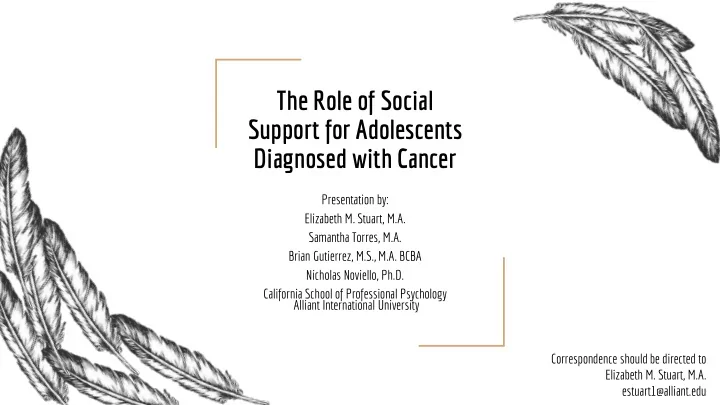

The Role of Social Support for Adolescents Diagnosed with Cancer Presentation by: Elizabeth M. Stuart, M.A. Samantha Torres, M.A. Brian Gutierrez, M.S., M.A. BCBA Nicholas Noviello, Ph.D. California School of Professional Psychology Alliant International University Correspondence should be directed to Elizabeth M. Stuart, M.A. estuart1@alliant.edu
Abstract Adding to the tumultuous changes brought on by physical and mental development during adolescence, the addition of a cancer diagnosis can create significant distress. Engagement in traditional social development is often not an option for this population, as they are required to remain largely isolated for long periods. The role of social support in ameliorating these negative experiences is often overlooked in medical settings. The aim of this presentation is to highlight clinical considerations for fostering social support among adolescents with cancer, as it has been documented to play a tremendous role in their treatment experience, well-being, and recovery.
Intro & Statement of Purpose ● Adolescence is a tumultuous time (Broderick & Blewitt, 2003). ● Cancer during such an already tumultuous time can create (Manne & Miller, 1998). ● Adolescence is a time of major social development (Wortman, 1984). ● A diagnosis of cancer often requires social isolation for long periods of time, which has been shown to stunt their social development (Finkel & Baumeister, 2010). ● A lack of support can lead to a host of difficulties (Finkel & Baumeister, 2010).
Social Development of Adolescents with Cancer ● Often, adolescents must withdraw from school and other social situations (Manne & Miller, 1998). ● Due to their heightened fragility, they must often withdraw from sports (Manne & Miller, 1998). ● Disruptions in school, social circles, and even family supports have been reported (Broderick & Blewitt, 2003). ● The most important social relationship for adolescents with cancer was reported to be the mother-child relationship (Manne & Miller, 1998). ● This has all been associated with a range of deleterious effects.
Impact of Poor Social Support ● Not having an adequate support network during treatment has been associated with ○ Increased depression and anxiety (Allen, et al., 1997; Ranmal, et al., 2008). ○ Psychological distress (McGregor & Antoni, 2008). ○ Poor adherence to treatment (Nichols, 1995). ○ Maladaptive coping skill use (Nichols, 1995). ○ Poorer physical health and recovery chances (Manne & Miller, 1998). ● Conversely, having a healthy support network has been associated with positive outcomes.
Future Directions ● Interventions ○ Group strategies to practice building social skills. ○ Autonomy-building individual intervention strategies. ○ Family therapy to address any familial relationship dysfunction. ● Research ○ Longitudinal research on the exact impact of the lack of social support on the adolescent. ○ Any effects that the major shift towards remote engagement due to COVID-19. ○ Mitigating impacts of having a support group during treatment.
References ● Allen, R., Newman, S. P., & Souhami, R. L. (1997). Anxiety and depression in adolescent cancer: findings in patients and parents at the time of diagnosis. European journal of cancer, 33(8), 1250-1255. ● Broderick, P. C., & Blewitt, P. (2003). The life span: Human development for helping professionals. Merrill/Prentice Hall. ● Finkel, E. J., Baumeister, R. F., Baumeister, R. F., & Finkel, E. J. (2010). Advanced social psychology: The state of the science (p. 419). New York, NY: Oxford University Press. ● Manne, S., & Miller, D. (1998). Social support, social conflict, and adjustment among adolescents with cancer. Journal of Pediatric Psychology, 23(2), 121-130. ● McGregor, B. A., & Antoni, M. H. (2009). Psychological intervention and health outcomes among women treated for breast cancer: a review of stress pathways and biological mediators. Brain, behavior, and immunity, 23(2), 159-166. ● Nichols, M. L. (1995). Social support and coping in young adolescents with cancer. Pediatric Nursing, 21(3), 235-240. ● Ranmal, R., Prictor, M., & Scott, J. T. (2008). Interventions for improving communication with children and adolescents about their cancer. Cochrane Database of Systematic Reviews, (4). ● Wortman, C. B. (1984). Social support and the cancer patient: Conceptual and methodologic issues. Cancer, 53, 2339-2360.
Recommend
More recommend